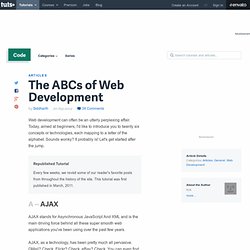

W3Fools – A W3Schools Intervention. Kick-Start Your Project: A Collection of Handy CSS Snippets. Don't start your project with an empty style sheet: there are many great snippets that can make your life easier and speed up web development.

We are going to show you some handy snippets that you might find useful for kick-starting your next project. In one of the previous articles “Basic Ready-to-Use CSS Styles”, we saw how we could create a suite of classes to help the design process while making a website. I hope you made your own set of patterns! Today we are going to see how we can continue this exercise with some things a little bit more technical. I’ll show you a bunch of CSS snippets you may or may not know, which can dramatically increase your CSS development speed.
Indeed, isn’t there some properties or CSS tricks you always have to check the syntax for, every single time you want to use them? Of course you do my friends! Before we go, let me tell you how I divided this article: Shorthand classes Let’s begin with shorthand classes, which are a very common things. Nothing more. Firefox's birthday present to us: Teaching tech titans about DIY upstarts. High performance access to file storage Open ... and Shut It's hard to believe it now, but not too long ago the web was dangerously close to being owned by one vendor: Microsoft.

As mainstream users came to equate Internet Explorer's logo with the Web, Microsoft worked to lock in its advantage with increasingly proprietary technology like ActiveX. It surely would have done so, too, but for the seemingly futile Mozilla browser, née Firefox. Born in the ashes of Netscape's failed browser business 10 years ago this month as Phoenix, Firefox 1.0 is arguably the most important technology developed in the last 50 years. Precisely because it is about more than technology. Yes, that Firefox, the one that for years gobbled away at IE's 95 per cent market share, only to be largely supplanted in the hearts and minds of the geek elite by Google Chrome (though not in actual market share).
Quixotic as it may sound, the purpose of Firefox was always to spread Web freedom. Take mobile, for example. The ABCs of Web Development. Web development can often be an utterly perplexing affair.

Today, aimed at beginners, I'd like to introduce you to twenty six concepts or technologies, each mapping to a letter of the alphabet. Sounds wonky? 5 Reasons Why Responsive Design Is Not Worth It. After the huge debate this original post created, we decided to refine and build upon the original article, bearing in mind the thoughts of some very insightful feedback left by some commenters.

You can find the new article here. “We’re just now starting to think about mobile first and desktop second for a lot of our products.” ~ Kate Aronowitz, Design Director, Facebook “[The shift to mobile design] is even bigger than the PC revolution.” ~ Kevin Lynch, CTO, Adobe In 2014, more people will be using mobile devices to access the internet than desktop PCs. Accessibility for mobile devices has become a huge priority for web developers. Responsive design is seemingly universally accepted as the way forward, but I am far from convinced. What is Responsive Design? Wikipedia describes responsive design as follows: So from one platform to the next, the design of a site will adjust based upon the device’s particular resolution and/or screen size restraints.
A Caveat Desktop Display Mobile display 1. 2. The innovations of Internet Explorer. Long before Internet Explorer became the browser everyone loves to hate, it was the driving force of innovation on the Internet.

Sometimes it’s hard to remember all of the good that Internet Explorer did before Internet Explorer 6 became the scourge of web developers everywhere. Believe it or not, Internet Explorer 4-6 is heavily responsible for web development as we know it today. A number of proprietary features became de facto standards and then official standards with some ending up in the HTML5 specification. It may be hard to believe that Internet Explorer is actually to thank for a lot of the features that we take for granted today, but a quick walk through history shows that it’s true. If Internet Explorer is a browser that everyone loves to hate, the Document Object Model (DOM) is the API that everyone loves to hate. In many regards, document.all was the very first version of document.getElementById().